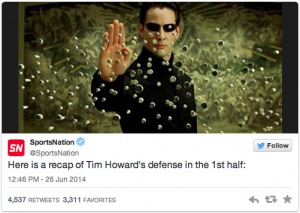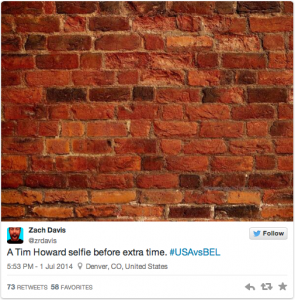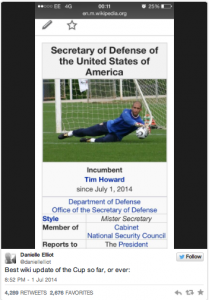Rule Number One of Soccer: You may not use your arms or hands.
Unless you’re the goalie.
Goalkeepers lead a strange existence in the football world. Their highly specialized position places them somewhat above the law and often removes them from the majority of the action during the game. In fact, you really don’t want your goalie in the middle of the action. That’s a bad sign- it usually means a lapse in defense, a penalty kick, a penalty shootout, or any other number of terrifying situations.
Because of this, it’s easy to see why the goalie can be a rather lonely player on the field. Separate from the rest of the team, the goalie is usually only looked to in times of trouble.
And Eduardo Galeano thinks that’s a very sad thing.
In his book, Soccer in Sun and Shadow, Galeano gives a bleak description of the life of the goalkeeper. Galeano writes,
“They also call him doorman, keeper, goalie, bouncer, or net-minder, but he could just as well be called martyr, pay-all, penitent, or punching bag. They say where he walks the grass never grows.
He is alone, condemned to watch the match from afar. Never leaving the goal, his only company the two posts and the crossbar, he awaits his own execution by firing squad. He used to dress in black, like the referee. Now the referee doesn’t have to dress like a crow and the goalkeeper can console himself in his solitude with colorful gear.
He does not score goals; he is there to keep them from being scored. The goal is soccer’s fiesta: the striker sparks delight and the goalkeeper, a wet blanket, snuffs it out.
He wears the number one on his back. The first to be paid? No, the first to pay. It is always the keeper’s fault. And when it isn’t, he still gets blamed. Whenever a player commits a foul, the keeper is the one who gets punished: they abandon him there in the immensity of the empty net to face his executioner alone. And when the team has a bad afternoon, he is the one who pays the bill, expiating the sins of others under a rain of flying balls.
The rest of the players can blow it once in a while, or often, and then redeem themselves with a spectacular dribble, a masterful pass, a well-placed volley. Not him. The crowd never forgives the goalkeeper. Was he drawn out by a fake? Left looking ridiculous? Did the ball skid? Did his fingers of steel turn to putty? With a single slip-up the goalie can ruin a match or lose a championship, and the fans suddenly forget all his feats and condemn him to eternal disgrace. Damnation will follow him to the end of his days.”
Galeano paints the life of the goalie as the beaten and bruised scapegoat, which I argue was too harsh and negative to be an accurate depiction of what a goalie actually experiences.
First, I want to address to the part about scoring goals. Galeano writes, “He does not score goals; he is there to keep them from being scored.The goal is soccer’s fiesta: the striker sparks delight and the goalkeeper, a wet blanket, snuffs it out.”
Granted, it’s a rare and pretty hilarious case. But the goalie that scored that goal- Tim Howard- provides a compelling counter case to Galeano’s portrayal of the goalie.
Tim Howard, the Team USA goalie, became a household name when he made a whopping 16 saves in one game- the 2014 World Cup match against Belgium- and set a World Cup Record. And America loved him immediately. The Alabama Local News had an article titled World Cup: America is celebrating Tim Howard, CNN had an article titled 10 surprising facts about America’s new soccer hero Tim Howard, and the LA Times ran an article simply called Tim Howard: American Hero. Twitter erupted with a wave of love and adoration for Tim Howard.
Someone even altered a Wikipedia page and named Tim Howard as the US Secretary of Defense (unfortunately, the page was changed back shortly after).
But here’s the catch-
Team USA lost that game.
Despite the miraculous show of Tim Howard, Team USA lost to Belgium. But, strangely enough, Howard wasn’t vilified. Nor was he to blame. Of course, some goals got past him during that match, allowing Belgium to win, but Howard wasn’t blamed for losing. Instead, he became a hero, appreciated for his valiant effort even though it didn’t end up paying off. If Galeano’s description was true, then Howard would not have been celebrated like he was, and he still would have had to shoulder the unforgivable burden of the goals that did get past him. So, in this painful time of loss, Howard became an American icon, contrary to what Galeano would have likely expected.
Of course, this might seem like one unique case. Howard did put on quite a show, and maybe Galeano was just giving a more general description. But if Galeano were right, then why does the goalie receive so much attention? Why is the goalie often connected with the word ‘hero’? (More articles to demonstrate this: Goalkeeper Guillermo Ochoa is the hero of Mexico’s 0-0 draw with Brazil, FC Dallas goalkeeper Jesse Gonzalez is the hero as Mexico captures CONCACAF U-20 title vs. Panama)
There’s a couple of reasons why this might be so. First of all, the Football-Bible explains that the goalkeeper is the “last line of defense” and the “first person in attack”. By last line of defense, they mean that once an offensive player gets past every other defender, the goalie is the very last chance to stop a run from turning into a goal. Also, the goalie often has some amount of leadership among the defense, as he is the last defender, and he often directs the defense from his position at the goalpost. So, even when everything else has gone wrong, and every defender has messed up in some way, the goalie can step in and stop what people often describe as ‘destiny’ or goals that were ‘fated’ or ‘meant to happen’. Because of this, the goalie is somewhat separate from the blame of the rest of the team- if they make a save. If they don’t, they may or may not be lumped into the blame with the rest of them.
Second of all, in a blog titled Alex’s Goalkeeping Obsession, blogger Alex points out the American obsession with goalkeeping, and pinpoints the classic American emphasis on freedom as the impetus. Essentially, the goalkeeper represents an American ideal- the goalkeeper is free to pursue his own agenda, away from the constraints of the strategic play of the rest of the team. He is the lone wolf, and with an extraordinary amount of effort at the right time, he can make himself a hero. It’s a very American romantic view of the position, and, while underdeveloped, it makes some amount of sense.
Therefore, before accepting Galeano’s dark version of the goalie, remember all the times that the goalie has been looked at as a savior rather than a scapegoat. Even in times of loss, the goalie isn’t necessarily a scapegoat, and Galeano’s description was a little too one-sided and pessimistic. Maybe being the lone ranger on the field and the odd man out isn’t always the worst thing in the world.







Great post! Thanks for sharing the clip of Tim Howard at Everton!
This is a really lovely post, Haley! Enjoyed your thoughts, and humor, tremendously. In terms of philosophy and goalkeeping, here’s a bit of information about Albert Camus as goalie: http://www.openculture.com/2014/11/albert-camus-soccer-goalie.html.